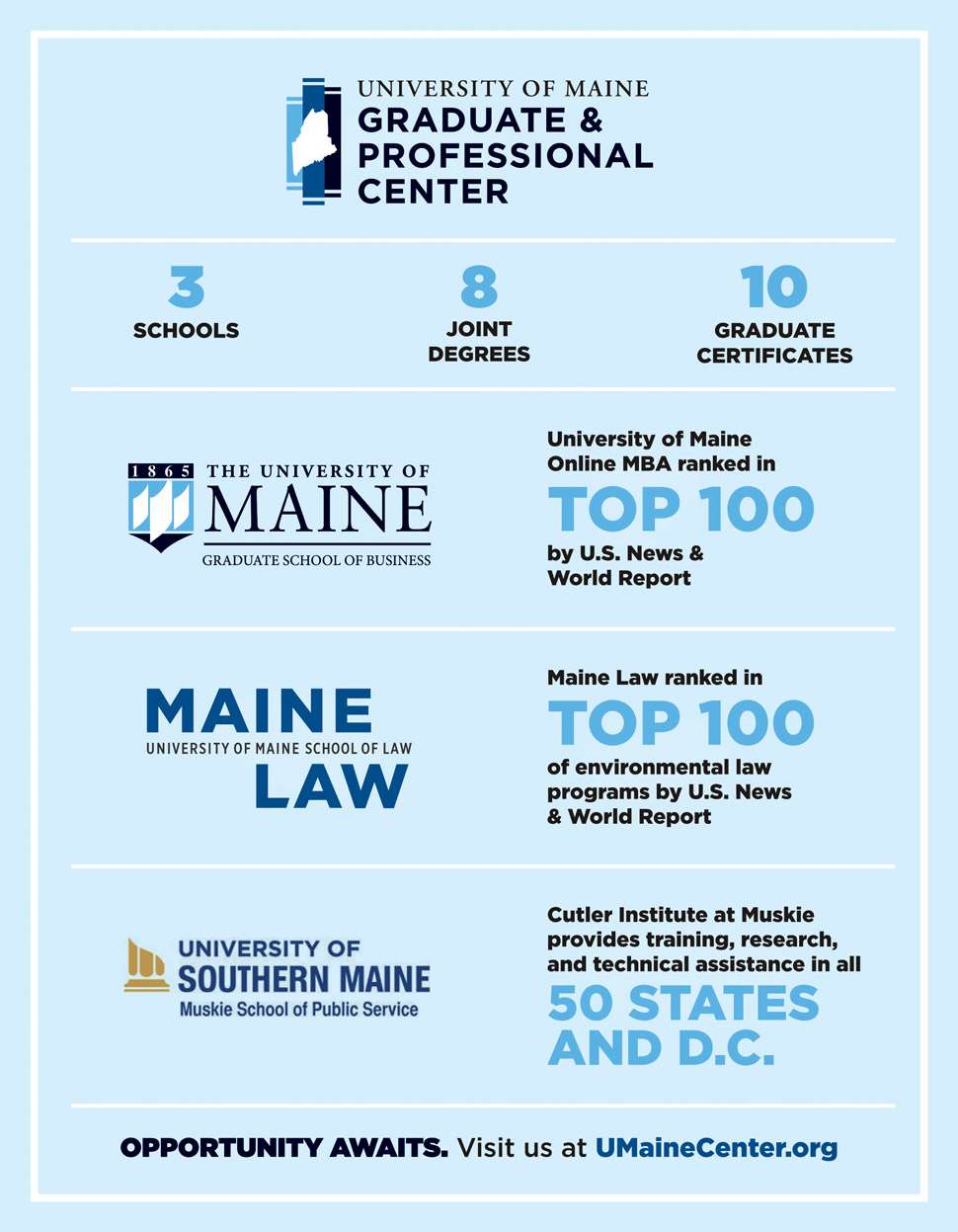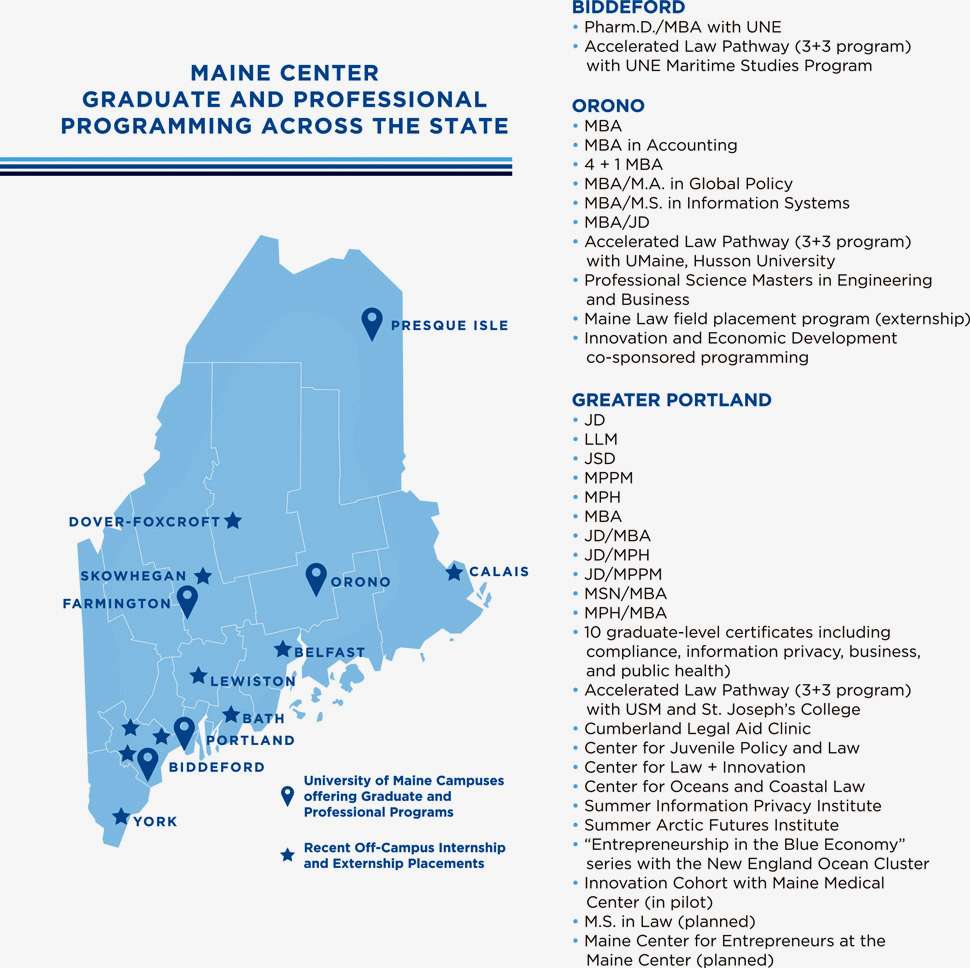
Processing Your Payment
Please do not leave this page until complete. This can take a few moments.
University of Maine Graduate and Professional Center
Educating a Professional Workforce For the Future
Regulatory compliance is a complex world that requires an understanding of laws, regulations, guidelines, and specifications pertaining to a given business. The ability to navigate compliance issues can be overwhelming for companies that may excel in their sector, but lack the legal background to fulfill the rules and regulations that govern their business.

Thanks to a new interdisciplinary, hands-on program offered by the University of Maine School of Law (Maine Law), part of the Graduate and Professional Center (the Maine Center) consortium, non-lawyers now have the opportunity to build the skills they need through Maine Law’s Certificate in Compliance Program. Having recently completed its second year, enrollment has already doubled, with employees from WEX, Unum, and Maine Medical Center among the participants.
The Certificate in Compliance Program is just one example of how the University of Maine Graduate and Professional Center, through its partnership with Maine Law, is helping employers to navigate issues that are outside their areas of expertise. Located in Portland but connected throughout the state, the Maine Center brings together graduate and professional programs in law, business, and public policy to train the workforce of the future, by delivering cross-disciplinary, experiential, and market-driven programming. The Maine Center is designed to foster collaboration across the public and private sectors and to serve students, businesses, and organizations statewide.
The Harold Alfond Foundation has been an early champion of the Maine Center. Their initial investment established Maine Center Ventures, a 501(c)3 to develop and implement the vision for the University of Maine Graduate and Professional Center.
We were inspired by the transformative vision of the Maine Center … a model that is truly unique, of the very highest quality, and that best serves the people of Maine. — Greg Powell, Chairman Harold Alfond Foundation
We were inspired by the transformative vision of the Maine Center … a model that is truly unique, of the very highest quality, and that best serves the people of Maine.
— Greg Powell, Chairman Harold Alfond Foundation
Reverse the brain drain
The Maine Center is an innovative academic consortium that comprises the University of Maine School of Law, the University of Maine Graduate School of Business, the Muskie School of Public Service and the Cutler Institute for Health and Social Policy. The consortium came about in an effort to address Maine’s very real demographic and economic challenges and is founded on the belief that leading-edge public education is a powerful catalyst for economic growth. A key to attracting and retaining new students and professionals is to provide high-quality, forward-looking, accessible graduate education that leads to marketable and relevant qualifications.
“This is a game-changer,” says Maine Center Ventures CEO Terry Sutton. “If you listen to the economic forecasters, it seems inevitable that Maine will lose talent as the population grows older and young adults move out of state. Maine has a brain drain. I view this initiative as an important strategy to reverse the brain drain.”
The Challenge
Here’s the overall scenario. Maine’s workforce is shrinking, aging and experiencing a growing skills gap. Maine workers need specialized training to keep up with the demands of the new emerging economy and its higher education institutions need to respond more quickly and creatively to employer needs.
At the same time, there is increased national competition for professionals and graduate-level students. Traditional degree programs are no longer the only option for graduate education: students and employers are evaluating cost, time, and delivery, and seeking convenient and flexible formats.

The Opportunity
Mainers are now competing in a much faster-paced economy, marketing goods and services in a much smaller world. Those who create, lead and manage Maine’s private and public enterprises need to be better and more broadly educated. There are bright spots in the economic forecast. Maine has a vibrant culture of entrepreneurs and a high first-year survival rate for startups. Maine continues to add jobs in high-wage sectors such as business and professional services, and to increase international trade.
The Maine Center is well placed to build on these positive trends by expanding and deepening the talent pipeline to support current employers and attract new businesses to the state. Three key strengths distinguish the consortium:
Innovation & Creativity: The schools of the Maine Center bring a powerful mix of vision, strategy and execution to the fields of business, law and public policy. In addition to conducting ground-breaking research and solving real-world problems, they are developing new programming that takes advantage of the inter-disciplinary strengths of the consortium.
Experiential Learning: The Maine Center offers students meaningful opportunities to practice their new skills in real world settings, believing that people learn best by doing, and skills and competencies are more valuable when they are grounded in actual application.
Service to the Community: Public universities have an obligation to support the broader community and contribute to the overall welfare of the state. The Maine Center feels this commitment deeply and wants to honor it, both by working directly to solve current challenges and by amplifying the work of others by sponsoring sector-specific initiatives and connecting the academic programs with the employer community.
Maine Center is a bold initiative that capitalizes on the strengths of our universities and recognizes the central role the University of Maine System plays in driving statewide economic prosperity.
— James Erwin, Chairman of the University of Maine System Board of Trustees
The Offer
The University of Maine Graduate and Professional Center offers a number of pathways to graduate students, professionals and businesses seeking to expand their knowledge and expertise.
Graduate / Professional Degrees: The Maine Center offers unique and innovative specialized degree programs that bring together business, law and public policy to produce highly qualified and employable leaders. As part of its core programming, the Maine Center aims to (i) deliver a student experience that engages with employers to gain more marketable, relevant skills and on-the-job training; (ii) design academic programming that is relevant, responsive and tailored to employer needs, and (iii) provide expanded opportunities for national and international education exchange.
Certificate Programs / Executive Education: In addition to its degree programs, the Maine Center provides specialized credentials that are highly desirable in today’s competitive marketplace. Certificates, like the Certificate in Compliance, provide businesses with targeted, timely expertise and professionals with marketable, relevant skills that make them more employable or allow them to increase their level of responsibility within an organization. The Maine Center will continue to develop a robust executive education program, including options for cohort-based programming to support the growth of promising managers in Maine.
Incubator/Accelerator: The Maine Center facilitates collaboration with entrepreneurs, startups and local businesses to foster innovation and new ways to cultivate economic growth and solve problems both within Maine and beyond. For example, the Entrepreneurship in the Blue Economy program is a series of networking events and panel discussions that bring together entrepreneurs and business leaders focused on growing Maine’s seafood industry and food economy in general.
Conferences/Events: One of the key functions of the Maine Center is to serve as a convener of the employer community; creating a space for employers and academics to connect as well as acting as a liaison between employers and the university system as a whole. An example of this work is the Arctic Futures Institute: a joint initiative between the Center for Oceans & Coastal Law of the University of Maine School of Law, the Climate Change Institute of the University of Maine, and the World Ocean Observatory. The mission of the Arctic Futures Institute is to understand and communicate issues relating to the northern latitudes through examination of policy and law, science and research, education and public engagement.
The University of Maine Graduate and Professional Center is a uniquely collaborative model with law, business and public service programs that are integrated, innovative and well-connected with the employer community throughout Maine. This cross-disciplinary, and market-driven approach will differentiate the Maine Center from traditional graduate programs and help Maine attract and retain talent to lead its evolving economy.


